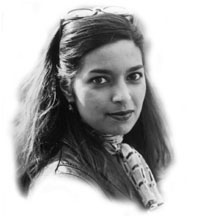The third panel I saw at the PEN World Voices New York Festival of International Literature was The Global City. The panel was structured around this:
With the majority of the world’s population now inhabiting urban areas, what is the future of the global city? Writers from six very different cities—Bombay, Rome, Cairo, Istanbul, and Mexico City—talk about constructing the metropolis with words.
I'm not sure I've ever liked a group of panelists more, everyone came across as warm, thoughtful, and interesting. It made you feel at home. They were:

Moderator
Suketu Mehta, an earnest and totally likeable guy who's oneof those genius Indians. He wrote Maximum City: Bombay Lost and Found, and his bio says: "He is currently writing an original screenplay for The Goddess, a Merchant-Ivory film starring Tina Turner. Mehta also cowrote Mission Kashmir, a Bollywood movie." I mean, wow! When he went to the lectern and started his remarks, I almost cringed, fearing it was going to go on too long and be too thorough. But it was really interesting; said for the first time in human history more people live in cities than villages; cities have stratified into being either for the rich--New York, London, Paris--or the poor--Bombay, Mexico City, Cairo. And that literature about the world's cities matters more now than ever, since the next generation of New Yorkers is being born in Lagos today. He quoted Woody Allen--a city dweller is at two with nature--and mentioned Jane Jacobs.
Plus, he introduced each panelist with a quotation from their work or an interview, several of them expressed astonishment that he'd been able to find the quote, which all seemed to fit really well. Unfortunately, the structure of this panel had each panelist reading for 10 minutes from their work--which was great for five minutes, but really dragged after a while, the pace was made especially glacial since English was clearly their second languages.

Egyptian
Alaa Al-Aswany, who's also a dentist apparently, and is a large, jovial guy, not like his photo. He read from The Yacoubian Building, a novel about the residents of an apartment building in Cairo. It made me think, of course, of
Nobel Laureate Naguib Mahfouz's Cairo trilogy, just like every book about a boy magician will always be compared to Harry Potter. The excerpt he read was about the old European part of Cairo, formerly forbidden to ordinary Egyptians, later transformed into a warren of illicit and increasingly shabby bars. His voice was rich and commanding, but also warm.

Brazilian
Paulo Lins is a slight, wiry man with a shaved head, who had an interpreter. Lins came across as gentle yet also made of steel; he read from Cidade de Deus, City of God, a novel about the slums of Rio he came out of that was made into an astonishingly gripping movie and is now being translated into English. The excerpt he read was about the aspiring photographer who contemplates crime as the only way to get out of poverty. His voice had a light, playful quality to it, but you could feel his sharpness and drive. His translator, incidentally, spoke into a little hand-held mike that connected to an earpiece Lins had; the translator only translated the remarks and asides of the other authors, not their reading of their work. Testament to how densely packed the written word is, in contrast to speech.

Italian
Melania G. Mazzucco was the only panelist I wouldn't call extraordinary--she was a curly-haired woman who seemed to me to have found a nice niche for herself, writing about Rome and New York City. It was like a panel of intellectuals, and her; she seems like a good writer but in the way people on the best-seller lists might be, rather than someone who'll be read 100 years from now. She read from Vita, about a group of Italian kids growing up in turn of the century New York City.

Mexican
Carlos Monsiváis, an elderly journalist and author with large glasses who came across as a salt of the earth type you'd trust about anything. He said he was so nervous he was just going to take recourse in reading his poor article, but that was just him being modest. His article was about Mexico City, a sense of the amazing squalor yet sheer scope of the place. Two lines in particular stuck with me: describing the hurry of the harried city he said humans are "a species hoping to arrive late at the Last Judgment". And he called Mexico City "the post-apocalyptic city", "the worst has already happened, but somehow the city functions".

Turk
Orhan Pamuk, the famous novelist and now political figure, looking suave and distinguished--not at all like his goofy picture. Also a bit nervous, I think, he kindof wasn't paying attention when the others were reading, like a kid anxious to get his turn over with. He apparently lives and writes in the same building that he grew up in; he read an excerpt from a memoir, Istanbul, that was essentially one long, amazing sentence, very Walt Whitman-esque in that it was just one phrase and image after another, each preceded by 'Of', describing his beloved Istanbul. My favorite was: "of everything being broken, worn-out, past its prime." He started out wanting to be an artist and photographer, can totally tell, each phrase was like a little photograph.
He also said he thought a word that summed up the Turkish people was their equivalent of the word 'melancholy', but the Turkish word apparently connotes also a 'nobility of failure' meaning, essentially the entire country was living in the ruins of an empire, but it was somehow okay, not to be celebrated, but nothing to be ashamed of, either, just sad.
After everyone read there wasn't much time left, Mehta had asked the audience to write up and pass in questions that he'd select from, but as it was the panel only had time to answer two of his questions each. He asked Monsiváis about the ongoing immigration protests in the U.S. and what he thought of it, quoting him as once writing that "the heart of the Mexican dream is Los Angeles." Monsiváis was astounded he'd found the quote but said it fit to a T, calling L.A. the second Mexican city, after Mexico City. He didn't seem that concerned about the protests, I think at this point it'd be like trying to put toothpaste back in the tube.
Lins was asked how he started writing City of God--he said originally, in college he wanted to be a poet. But he said the novel was because of the U.S. Embassy. At the time, he was one of only four students at his university who came from the slums of Rio--where at the time there were 150,000 people; the U.S. government, as part of it's Partnership for Peace program in the 60s and 70s, had created the slums, having moved them out of downtown Rio to outside the city, 60 kilometers away. An anthropology student had asked him to help her with an oral history project on the slums, since he was there--he said he didn't want to do it, but she was cute, so he did.... He had no interest in anthropology, but his job was to interview people and then transcribe the interviews; for the final report, he tried writing up some of the interviews as a long poem, which eventually he reshaped as a novel.
Al-Aswany then jumped in that his novel also owed its birth to the U.S. Embassy--apparently in Cairo the embassy wanted to clear the ground next to its building, and as the demolition of the neighboring building began Al-Aswany walked by and saw that the entire front wall of the building had been taken down, leaving all the interior apartments--whose residents had in their haste to leave left many items behind--totally exposed. He started imagining what events must have taken places in these buildings, from arguments to quiet dinners to parties, and wrote the novel from there.
The other panelists related other anecdotes about their novels; unfortunately, with the lack of time we never got to hear them talk more about their cities, or how they compared or didn't compare to each other.
Nevertheless, although it's hard to describe precisely, I think everyone left the panel feeling like we'd seen something special. All these great authors from such different places who obviously didn't know each other beforehand, up on stage discovering each other and interacting, all played out in front of us. You got the sense that they had a lot of respect for each other--it was the camaraderie that veterans have.
Somehow the chemistry on the panel meshed; I really wish it could've gone on for hours. This was definitely my favorite panel in terms of which one I'd most enjoy having dinner with afterwards--I imagine everyone being generally mellow, with lots of interesting insights and unexpected knowledge, and just a cool vibe. And good manners.




























